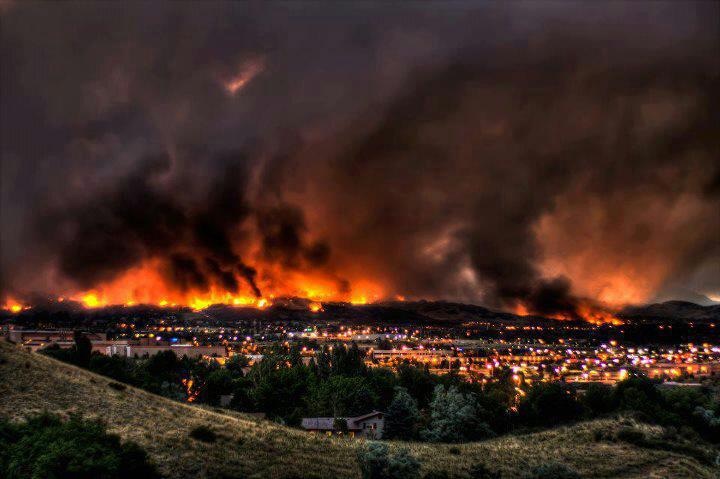It was Saturday, June 23rd. I was returning from a beautiful hike along the back side of Pikes Peak. A hike that earlier left me breathless and marveling at the glory, beauty and majesty of the Colorado mountains. As I moved eastward I began to notice some small funnels of smoke on the horizon. Shocked, the closer I got to Colorado Springs, I began to see firetrucks, onlookers parked on Highway 24 and dozens of emergency workers gathering at the Waldo Canyon entrance. Within a few miles, the small white clouds billowing in the distance turned into an ominous fire raging across the mountain side. The next week I experienced a great sense of anger, loss and grieving that I could not have anticipated. Some lost their homes and possessions and are searching for ways to get their arms around their emotions. Others feel a great loss in the damage that was done to our Colorado Springs…my Colorado Springs! I, too, search for ways to better understand how I am to deal with this tragedy.
Kubler-Ross has some practical and powerful insights into the grieving process. Whether we lose a loved one, a home, a job or a “way of living”, I believe the stages she has suggested are applicable. Every individual is unique and handles loss differently. No two individuals grieve the same. However, Kubler-Ross’ model helps give us some “footholds” to journey through personal loss. I hope my insights can give you hope and help you traverse these difficult times when loss surrounds us in Colorado Springs.
In this first of three blogs relating to the Waldo Canyon Fire, I am going to briefly highlight Kubler-Ross’ model and how it can provide a context to understand our own grieving. These stages are typically experienced by those dealing with loss but should not be seen as prescriptive or linear steps. The first stage of the grieving process is denial. We don’t want to believe that the loss occurred and try to rationalize it away. When I first saw the fire while driving through the Waldo Canyon area, my first response was to underestimate the gravity and the extent of the fire. This could not be that big of a deal, I reasoned to myself.
An individual then typically moves to the second stage of the grieving process, anger. We ask questions like, “Why is this happening?” or “Why is this happening to me?” We lash out in hopes of finding something or someone to blame or some way to make sense of the loss. Though this may at times be directed at God, many times it is towards another close to us or the individual that may have caused the loss. Either way, this response is a necessary stage in the healing process and is actually an anchor that helps you move toward healing. When the second, more aggressive wave came down the range toward the City and forced sections of northern Colorado Springs to be evacuated I remember my escalated emotions as I screamed out, “Why is my city burning? What will come of the hiking trails, the forest, the animals, the devastated lives and homes?”. I was angry.
The third stage, bargaining, is characterized by an internal struggle to make sense of the disaster and seek to position things differently so as to avoid the inevitability of the loss and its consequences. “If only…” we say to ourselves. If only I could get out of the Springs, then the fires would not be so devastating, I said to myself. We innately believe that if we could change our circumstances that it would change the outcomes of the loss. Individuals may move back and forth between anger and bargaining as they seek answers. Like the other stages, this is a normal path individuals take in their journey to acceptance.
When an individual comes to the conclusion that their anger or bargaining cannot make sense of the loss, they go through a deeply sad state and internalize the loss. This stage of grieving, depression, can be characterized by emotional instability, loss of sleep, disconnection, and loss of appetite. This is not abnormal and is only natural when a great loss has occurred. It is important at this stage that individuals seek out others that can support them in this season and help them move to the next stage.
The final stage of grieving a loss is acceptance. At first glance this might seem a bit insincere to suggest to anyone that they should simply “accept things and get on with life.” That is not what I am proposing. Acceptance is not a notion or reality that things are merely “going to be okay.” It is the ability to accept the new reality as a permanent reality. Too often individuals hold on to the reality prior to the loss as the only palatable and acceptable reality. Acceptance allows those grieving to move forward and build on the new reality. As I view the scorched mountainside and hear the stories of hundreds of homes lost I have to realize that it will take some time for Colorado Springs to heal from the devastation. There will be hundreds of moments ahead where I will be captivated with the beauty and splendor of Colorado. The Waldo Canyon Fire, as real as it is, cannot keep me from adjusting to that new reality.
I hope this blog gives all of us some insight into what we as a City are experiencing this day. Let us encourage one another to move forward and, as the range will move toward healing, move toward a new reality that offers new experiences and new opportunities.


